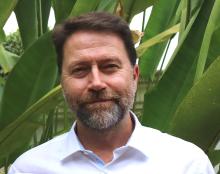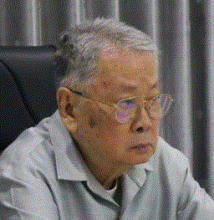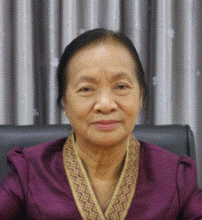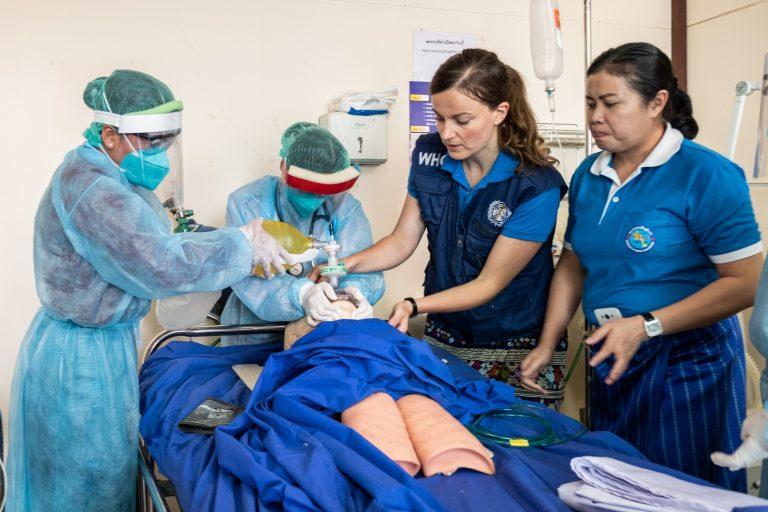Lao PDR has introduced a system of licensing and registration to monitor and reinforce the skills of existing health workers and ensure high quality education and training for the coming generations of health workers.
Strengthening human resources for health, as the backbone of the health system, is a key area for achieving universal health coverage (UHC). During the COVID-19 pandemic, highly-skilled health workers are more valuable than ever.
Health workers are qualified to provide good quality and safe health services, which also increases the public’s trust in the country’s health system.
WHO, through the UHC Partnership, supported the Ministry of Health to reform the health sector and make progress towards UHC, with a focus on strengthening the regulatory system for human resources for health.

“The UHC Partnership has provided vital support in enabling WHO to support Lao PDR’s Ministry of Health to reform the health sector and make progress towards universal health coverage (UHC),” said WHO Representative to Lao PDR. The health workforce is the bedrock upon which any health system is built, so the Ministry’s work on human resources for health is of key importance. If it is to deliver good quality care for all, the Lao PDR health system needs to reinforce the skills of frontline staff.”

"The Healthcare Professional Council work will contribute to fully support the education, training and continued professional development, with the aim of reaching the target of universal health coverage […] Patients will benefit from improved quality and safety of services and competencies, based on trust and satisfaction.”

“In the situation of COVID-19, nurses work as frontline workers. Therefore, nurses are required to have even more competence and a full set of skills to serve the people who come to use health care services.”
THE LONG READ
“When I got my licence, I felt confident in providing health services to the public and it also reminds me that I need to focus on providing good clinical care to patients,” said Ms Bounmala Sorpaseut who had just received an official licence to practice from the Government of Lao PDR. She is currently Deputy Head of Nursing at the Children’s Hospital in the country’s capital, Vientiane.
“I will continue to provide good service and improve my professional career,” she added.
The hospital where she works is state-owned and treats over 100,000 children each year. This is critical in a country where it is still quite common for children to die from preventable and treatable diseases, such as dengue fever, pneumonia and diarrhoea. During the time of COVID-19, strong nursing skills and a competent health workforce are more important than ever before.
Health workers at this hospital, including doctors, nurses, midwives and dentists, are the first to be formally licensed by the Ministry of Health. The licensing scheme is part of a new government initiative to monitor and reinforce the skills of existing health workers and provide high quality education and training to the coming generations of health workers. With support from the UHC Partnership, WHO in Lao PDR has assisted the Ministry of Health’s work in close collaboration with the country’s Healthcare Professional Council, in this area.
The UHC Partnership, hosted by WHO, assists 115 countries in accelerating progress to achieve UHC through funding provided by the European Union (EU), the Grand Duchy of Luxembourg, Irish Aid, the Government of Japan, the French Ministry for Europe and Foreign Affairs, the United Kingdom – Foreign, Commonwealth & Development Office and Belgium.
The work in Laos started four years before the pandemic struck, but COVID-19 has highlighted just how vital it is that all health workers have the confidence and skills they need to protect and treat patients and to prevent and control infection.
“In the situation of COVID-19, nurses work as frontline workers. Therefore, nurses are required to have even more competence and a full set of skills to serve the people who come to use health care services,” said Ms Phengdy Inthaphanith, Head of Nursing/Midwifery Board, Healthcare Professional Council.


Strengthening the regulatory system and medical education reform
Improving the quality and safety of healthcare services is a national priority, and the Government has made enormous efforts to strengthen the regulatory system for human resources for health. The goal is to make sure that all health workers are qualified to provide good quality and safe healthcare services, and through this, to build public trust in the country’s health system.
As part of these efforts, the Government developed a Strategy on Healthcare Professional Licensing and Registration 2016-2020. This laid the path to introduce a licensing and registration system for health professionals, doctors, dentists, nurses and midwives. This regulatory scheme is also related to medical education reform as it introduces licensing examinations for graduates to get their initial license, mandatory clinical training as a requisite for full license and continuing professional development for re-licensing every five years. In addition, there are active discussions on improving overall pre-service and in-service trainings.
The Government established the Healthcare Professional Council in the Ministry of Health in February 2017 to implement the licensing and registration system. The Council is composed of three Boards: Medical, Dental and Nursing & Midwifery Boards. WHO supported the Medical Board to improve their capacity to introduce national licensing examinations, multiple-choice questions and Objective Structured Clinical Examination for medical doctors.

In June 2020, healthcare professionals in the Children’s Hospital, one of five central hospitals in Vientiane Capital, received the first licences issued by the Ministry of Health. The licences are not only a source of pride among staff members, they will also ensure the ongoing delivery of high-quality services to patients in health care settings.
“The role of nurses is becoming more visible and important in the health system, particularly at health care facilities. Nurses are very proud to receive their licences, and their work is contributing to better quality health services,” said Ms Phengdy Inthaphanith, Head of Nursing/Midwifery Board, Healthcare Professional Council.
The Healthcare Professional Council has played a key role in ensuring the implementation of this licensing scheme. The Council is now travelling to provinces to support licensing and registration of healthcare professionals in provincial and district health facilities.
“The Healthcare Professional Council work will contribute to fully support the education, training and continued professional development, with the aim of reaching the target of universal health coverage […] Patients will benefit from improved quality and safety of services and competencies, based on trust and satisfaction,” said Dr Ponmek Dalaloy, the Healthcare Professional Council President and former Minister of Health, Lao PDR.

Human resources for health as a pillar of health sector reform
“The UHC Partnership has provided vital support in enabling WHO to support Lao PDR’s Ministry of Health to reform the health sector and make progress towards universal health coverage (UHC),” said WHO Representative to Lao PDR, Dr Mark Jacobs. “The health workforce is the bedrock upon which any health system is built, so the Ministry’s work on human resources for health is of key importance. If it is to deliver good quality care for all, the Lao PDR health system needs to reinforce the skills of frontline staff,” he added.
Lao PDR has a strategic goal to achieve UHC by 2025 and strengthening human resources for health is one of the five pillars of its health sector reform, along with service delivery, financing, governance, management and coordination, and monitoring and evaluation.

The Ministry of Health has identified human resources for health as a key priority area, noting the importance of having a sufficient number of skilled professionals. This means monitoring and reinforcing the skills of existing health workers as well as providing high quality education and training to future health workers.
The work started with a WHO-supported mid-term review of progress in implementing the country‘s Health Personnel Development Strategy and development of a Regulatory Framework for the Registration and Licensing of Healthcare Professionals in close collaboration with development partners. Later, WHO provided support in improving the health sector’s human resources information system – the Health Personnel Information Management System. In 2020, through collaboration with the Ministry of Home Affairs, WHO supported the Ministry of Health to develop new guidelines for incentives for human resources for health as well as job descriptions for health workers. These aim to provide clear guidance on roles and responsibilities at each level of service delivery.

A major step towards health for all
At the end of November 2020, Lao PDR had so far escaped a severe impact of COVID-19, with a total of only 39 cases. The Government had responded to the pandemic effectively by making timely decisions to introduce and later ease public health and social measures. With support from WHO and other partners, the Government has also made great efforts to prepare the health system for early detection, testing and clinical management.
The urgent need to achieve UHC still remains however, and having a strong, well trained, motivated and confident health workforce, is key to achieving this.
